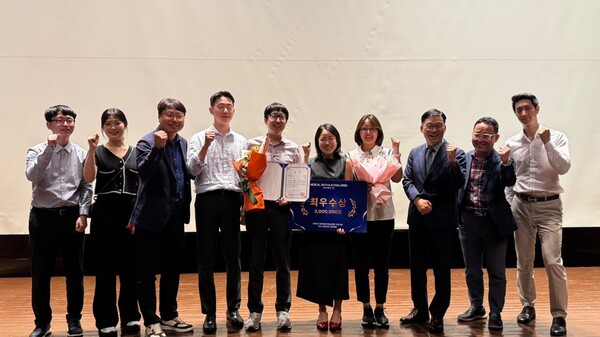A research team at Konkuk University Medical Center won the grand prize in a competition aimed at discovering innovative ideas in digital healthcare, utilizing medical data and artificial intelligence (AI).
The university hospital announced on Friday that its “KONNECT” team won the grand prize at the “Medical Data & AI Challenge” competition for its model, which utilizes AI to predict severe blood toxicity that can occur during cancer radiation therapy.

The competition was a national event organized by the University of Korea Seoul St. Mary's Hospital Consortium as part of the 2025 Medical Data-Centered Hospital Support Project. After preliminary and final rounds, one team each received the grand prize and the excellence award, two teams received the encouragement award, and three teams received the idea award.
Konkuk University Medical Center participated under the team name KONNECT, which comprised Professor Jang Jeong-yun of the Department of Radiation Oncology, Professor Ha Chang-hee of the Department of Diagnostic Pathology, Professor Bang Kyung-hye of the Department of Hematology and Oncology, Kim Seong-hae, director of the Medical Information Office, and members of the Medical Information Team.
The research project titled “Hematologic Event Monitoring and Analysis with AI for Treatment-related Cytopenia in High-risk Patients Undergoing Chemoradiotherapy (HEMA-WATCH),” which won the grand prize, is a system that predicts the likelihood of hematologic adverse effects, such as anemia or neutropenia, every week based on clinical information and blood test results before and after treatment.
It was developed using a common data model (CDM) shared by Seoul St. Mary's Hospital, Asan Medical Center, National Cancer Center, Chung Ang University Medical Center, and Konkuk University Medical Center. The prediction results are designed to be integrated with electronic health record (EHR) systems or mobile apps to enable early identification of high-risk patients.
While previous models primarily relied on static predictions using fixed information before treatment initiation, this model analyzes real-time blood data in a time-series format during treatment. Such an approach is rare both at home and abroad, and its practicality and scalability have garnered significant attention.
“We designed a structure that goes beyond simple prediction to enable prediction results to be linked to real-time clinical intervention,” the KONNECT team said. “This demonstrates that AI-based digital platforms can serve as a practical tool for reducing treatment discontinuation and improving survival rates in high-risk cancer patients.”

